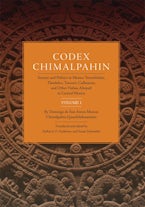Indian Women of Early Mexico
by Susan Schroeder, Stephanie Wood and Robert Haskett
Published by: University of Oklahoma Press
Imprint: University of Oklahoma Press
500 Pages | 6 x 9 | 10 b&w illus, 6 maps, 4 tables
$24.95
This volume counters the stereotype that Indian women are without history. Neither silent nor invisible, women of early Mexico were active participants in society and critically influenced the direction history would take. This collection of essays by leading scholars in Mexican ethnohistory, edited by Susan Schroeder, Stephanie Wood, and Robert Haskett, examines the life experiences of Indian women in preconquest and colonial Mexico.
Susan Schroeder is France Vinton Scholes Professor of Colonial Latin American History Emerita at Tulane University and coeditor of Indian Women of Early Mexico and Chimalpahin’s Conquest: A Nahua Historian’s Rewriting of Francisco López de Gómara’s “La Conquista de México.”
Stephanie Wood, Director of the Wired Humanities Projects, University of Oregon, is coeditor of Mesoamerican Memory: Enduring Systems of Remembrance and Indian Women of Early Mexico, also published by the University of Oklahoma Press.
Robert Haskett, Professor of History, University of Oregon, is the author of Visions of Paradise: Primordial Titles and Mesoamerican History in Cuernavaca.
“A welcome addition to the colonial Mexican bibliography, both as a supplementary textbook for university teaching and as a scholarly resource. . . . The book’s fourteen essays are distinguished by their regional foci and cluster thematically around women in the family, inheritance, marital patterns, and sexuality as well as women’s roles as economic producers and active participants in religious movements and open rebellions in the context of Iberian colonialism.”—American Historical Review
“This volume takes the reader on a most rewarding voyage of rediscovery of Indian womanhood in colonial Mexico. . . . Without having to argue any brand of historical feminism, or strictly adhering to anyWestern theoretical conceptualization, the authors succeed in putting together a compelling array of information that both fascinates and informs.”—Journal of Latin American Studies












